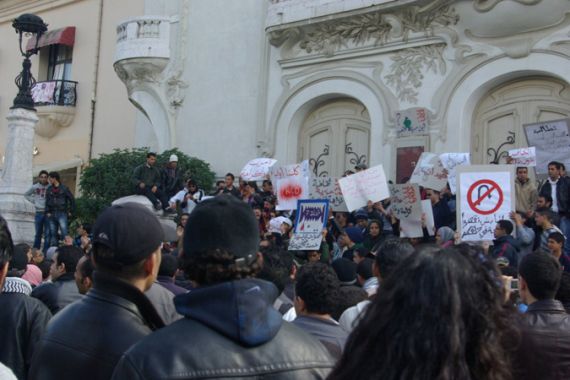Change comes to Tunisia, slowly
Ben Ali might be gone but it is still unclear how much social and economic transformation will take place.

Did the fall of Zine El Abidine Ben Ali amount to a genuine revolution? Three weeks after Tunisia’s president of 23 years, facing public protests, fled to Saudi Arabia, this is a question that ordinary people are still grappling with.
Though the Ben Ali regime may be going, or gone, it is unclear to what extent the political changes will lead to the decisive social and economic transformations that protesters have been calling for – particularly in the marginalised central and southern regions.
Yet the social transformations that are taking place on the streets of Tunis, whether in the commercial downtown area or the bourgeois eastern suburbs or the poorest suburbs, are undeniable.
After a quiet Sunday, central Tunis was again abuzz with a steady flutter of micro-protests – once inconceivable, now daily – as the week began anew on Monday.
A crowd gathered around a man who, seated on the sidewalk of Avenue Habib Bourgeiba, busily draw political drawings.
Across the avenue, spray painted messages read “Thank you Facebook” and “Tunisia democratic and secular”.
A group of young women approach, asking if I am a journalist. They work for the municipal council and will be holding their own protest for better salaries and employment conditions.
“Come to the Casbah tomorrow at 9am to show solidarity!” they ask.
Opulent lifestyles
In Gammarth, an eastern suburb which some of the most notorious members of the Trabelsi and Ben Ali families called home until less than a month ago, a steady flow of curious Tunisians are coming to see the ruins of the opulent lifestyle that their rulers led behind closed doors.
Ali Abdirazak, a Tunisian who lives in Paris, was doing a round of the ravaged houses with a carload of friends on Monday afternoon.
“I’ve been living it on the internet,” Abdirazak said, standing inside Mourad Trabelsi’s former living room.
A man and his mother walked back to their car with souvenirs they had taken from the house.
“We have always driven by this house but we had no idea how extravagant it was inside, he said, carrying a white slab of marble under one arm.
“I’m keeping this for my children, to show them what the people can achieve.”
The end of the Trabelsi era has also brought change in nearby Bhar Lazreg, one of the capital’s poorest suburbs.
Bhar Lazreg was the stomping ground of Imed Trabelsi, the former first lady’s nephew who is the subject of an international arrest warrant for his financial dealings.
Aside from his yacht- and car-stealing activities in Europe, Imed Trabelsi and his associates terrorised the impoverished inhabitants of Bhar Lazreg.
Alcohol stand
One of the symbols of Trabelsi’s tyranny was an illegal alcohol stand that people Al Jazeera spoke with said shamelessly exploited their misery.
Now, the locals have shut down the black-market stand for good, and all that remains of the gutted building are its ashes. Few appeared sorry to see it go.
“Everyone felt it was an intrusion, there were always drunk people in the street causing problems,” Abdelkarim Ayouni, a local man, said.
People here have been able to reclaim land that had been “confiscated” from them.
Trabelsi family members used fraudulent papers to trump land deeds here, as they did across the country. Corrupt [or fearful] officials would ignored legal documents, rendering locals landless without hesitation.
There is a flurry of building as people take back their land.
The army came in to restore order in late January, ensuring that those taking back land were the legitimate owners.